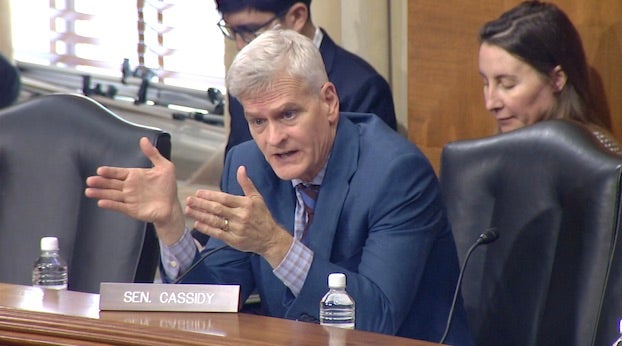Jim Beam column: Mississippi setting the pace
Published 6:41 am Thursday, July 21, 2022

- Louisiana legislators failed at their last session to do something about reading problems in elementary schools and creation of a centralized collection system for state and local sales taxes.wvue-fox8
Whenever Mississippi gets ahead of Louisiana at the bottom of many state rankings, you know this state is in real trouble. Our neighboring state has scored high on its reading program for elementary students, and it has a centralized system for collecting state and local sales taxes.
Two efforts at the recent legislative session to do something in both those areas failed. A bill aimed at helping youngsters improve their reading skills and a proposed constitutional amendment setting up a centralized sales tax collection system both died on the calendar at the last minute.
Rep. Richard Nelson, R-Mandeville, sponsored the reading bill that would have prohibited promotion to the fourth grade of students whose reading deficiencies weren’t corrected by the end of the third grade.
Trending
The legislation passed the House 84-12 but failed 18-14 in the Senate, two votes short of a majority. The House voted 86-12 to reconsider the bill, but the Senate refused to do it on the last legislative day.
Supporters of Nelson’s reading bill argued that as much as 40 percent of third graders don’t read proficiently enough to be promoted to the 4th grade, according to a report in The Advocate.
A 2013 Mississippi law requires third graders to pass a reading assessment, and they are given three tries in order to qualify for promotion to the fourth grade. Mississippi finished first in the nation for gains on the national report card, with fourth-grade children making the biggest improvement in reading and math between 2017 and 2019.
Senators were concerned about holding back third graders, saying it could lead to overcrowded classrooms. However, Republican Sens. Mark Abraham and Jeremy Stine, both of Lake Charles, and Mike Reese of Leesville voted for the bill.
Students who would have been held back would have undergone extensive remedial work, including at least 90 minutes per day during school to work on phonics, fluency, comprehension, and other essential reading skills.
This is legislation that needs to come back next year. Sen. Sharon Hewitt, R-Slidell, sponsored a different reading bill and explained why reading is so important. Hewitt said if you can’t read, nothing else matters.
Trending
Speaker of the House Clay Schexnayder, R-Gonzales, was author of the sales tax collection amendment. Voters rejected an identical amendment last November by a 52 percent margin.
This year’s proposed amendment passed the House 96-0 and the Senate 31-3. The Senate amended the bill but Schexnayder, for reasons unknown, returned it to the calendar before agreeing to the changes the day before the session ended.
Louisiana has one of the most complex sales tax structures in the country. It is one of only three states without a single centralized sales tax collection agency. The Tax Foundation said Arizona lacks a uniform sales tax base and Alabama lacks centralized administration, but Louisiana and Colorado lack both of those.
Sen. Stine made perhaps the best argument for a centralized state and local sales tax system when he explained that his family’s Stine Lumber Co. has 11 locations in Louisiana and one in Natchez, Miss. The company files only one return in Mississippi, which has a centralized collection system.
“As much as it pains me to say this, it’s far easier for us to do business in Mississippi than it is in Louisiana when it comes to sales tax,” Stine said. ”We run trucks all around the region in Mississippi, and we pay to one place, and that’s in Jackson, Miss. We’ve got two ladies in our office in Sulphur. That’s all they do all day long — remit taxes to different taxing authorities. It is burdensome.”
The Sales Tax Institute said Louisiana has 370 sales tax jurisdictions. The state has 57 state tax collectors.
Louisiana did set up a commission to collect all online state and local sales taxes. Republican Sen. Bret Allain of Franklin sponsored a bill at the recent legislative session that would allow local officials to opt into having all their taxes collected by the online collection agency.
How many taxing jurisdictions will agree to do that remains to be seen. However, some tax experts believe Louisiana’s current sales tax collection system could eventually be declared unconstitutional under a fairly recent U.S. Supreme Court decision.
Why should the state have to wait for a court decision? Legislators, local government agencies that resist centralized collections and voters need to step up to the plate and join the 47 states that saw the light a long time ago.
Our businesses deserve nothing less.





